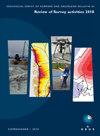Inventory of onshore petroleum seeps and stains in Greenland: a web-based GIS model
IF 1.3
4区 地球科学
Q1 GEOLOGY
引用次数: 5
Abstract
A new inventory on onshore petroleum seeps and stains in Greenland has been released by the Geological Survey of Denmark and Greenland as a web-based GIS model on the Greenland Mineral Resources Portal: Petroleum Seeps and Stains in Greenland. Knowledge on oil and gas seeps, oil stains and solid bitumen occurrences provides key information on mineral and petroleum systems, especially in frontier basins. As the understanding of recent and previous migrations of fluids and gases is important for both mineral and petroleum explorations in Greenland, this new inventory has been developed to facilitate exploration and new activities. The classification includes the following types of occurrences: (1) oil seeps, (2) gas seeps, (3) mud diapirs, pingos and gas-rich springs, (4) oil stains in volcanics, carbonates and sandstones, (5) solid macroscopic bitumen and (6) fluid inclusions and other evidence of micro-seepage. The inventory comprises detailed information on localities, coordinates and sample numbers. It also includes descriptions of features and geology, references to data, reports and publications. All information is summarised in either a mineral or petroleum systems context. Petroleum seeps and stains have been reported from most Palaeozoic, Mesozoic and Cenozoic basins in Greenland where they add important information on petroleum systems, especially distribution and facies variation of source rocks, petroleum generation and later migration, accumulation, remigration, uplift and degradation. The inventory is designed to be updated with additional localities and descriptions and new organic geochemical data. This paper provides a general overview of classification, nomenclature, organisation and content of the inventory. We introduce the regional distribution of petroleum seeps and stains in Greenland and general interpretations in the context of mineral and petroleum systems.格陵兰陆上石油渗漏和污渍清单:基于网络的GIS模型
丹麦和格陵兰地质调查局在格陵兰矿产资源门户网站上发布了一份关于格陵兰陆上石油渗漏和污渍的新清单,作为一个基于网络的GIS模型:格陵兰的石油渗漏和污点。关于石油和天然气渗漏、油渍和固体沥青矿点的知识提供了有关矿物和石油系统的关键信息,特别是在边界盆地。由于了解最近和以前的流体和气体迁移对格陵兰的矿产和石油勘探都很重要,因此制定了这一新清单,以促进勘探和新活动。该分类包括以下类型的矿点:(1)石油渗漏,(2)天然气渗漏,(3)泥底辟、平果和富气泉,(4)火山岩、碳酸盐岩和砂岩中的油渍,(5)固体宏观沥青,(6)流体包裹体和其他微渗漏证据。清单包括关于地点、坐标和样本数量的详细信息。它还包括对地貌和地质的描述、对数据的参考、报告和出版物。所有信息都是在矿产或石油系统的背景下总结的。据报道,格陵兰岛大多数古生代、中生代和新生代盆地都有油气渗漏和污渍,它们为油气系统,特别是烃源岩的分布和相变化,油气生成和后期的运移、聚集、再运移、抬升和退化提供了重要信息。该清单旨在更新更多的地点和描述以及新的有机地球化学数据。本文对存货的分类、命名、组织和内容进行了概述。我们介绍了格陵兰岛石油渗漏和污渍的区域分布,以及在矿物和石油系统背景下的一般解释。
本文章由计算机程序翻译,如有差异,请以英文原文为准。
求助全文
约1分钟内获得全文
求助全文

 求助内容:
求助内容: 应助结果提醒方式:
应助结果提醒方式:


